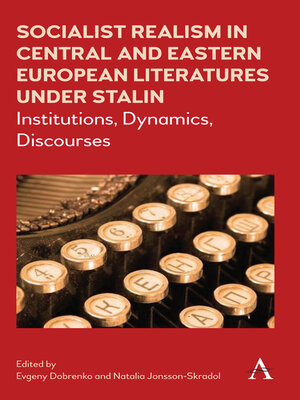Socialist Realism in Central and Eastern European Literatures under Stalin
ebook ∣ Institutions, Dynamics, Discourses · Anthem Series On Russian, East European and Eurasian Studies
By Evgeny Dobrenko

Sign up to save your library
With an OverDrive account, you can save your favorite libraries for at-a-glance information about availability. Find out more about OverDrive accounts.
Find this title in Libby, the library reading app by OverDrive.



Search for a digital library with this title
Title found at these libraries:
| Library Name | Distance |
|---|---|
| Loading... |
Socialist Realism in Central and Eastern European Literatures' is the first published work to offer a variety of alternative perspectives on the literary and cultural Sovietization of Central and Eastern Europe after World War II and emphasize the dialogic relationship between the 'centre' and the 'satellites' instead of the traditional top-down approach. The introduction of the Soviet cultural model was not quite the smooth endeavour that it was made to look in retrospect; rather, it was always a work in progress, often born out of a give-andtake with the local authorities, intellectuals and interest groups. Relying on archival resources, the authors examine one of the most controversial attempts at a cultural unification in Europe by providing an overview with a focus on specific case-studies, an analysis of distinct particularities with attention to the patterns of negotiation and adaptation that were being developed in the process.
|This volume brings together articles written by experts in the literary history of Central and Eastern European literatures. The overarching topic is the export of Socialist Realism into Europe after WWII, but the authors are interested not so much in highlighting the generalised, top-down mechanism of the project, as in the particularities of each specific national and cultural context. Research shows that in practice the introduction of the Soviet cultural model was not quite the smooth endeavour that it was intended to be; rather, it was always a work in progress, often born out of a give-and-take with the local authorities, intellectuals and interest groups. Those in charge negotiated the precarious terrain of local cultural and political controversies, caught between tradition and innovation in some countries, or, in others, between a sincere interest in the new concept of art and a complete refusal to accept new rules. Paradoxically, among all the different experiences of introducing, importing imposing Socialist Realism in the specific national contexts, the one thing in common is that each case was a response to the local conditions, a process of working through the challenge of inscribing a staunch theory into the daily reality of an unfamiliar country, language and culture.
The general approach shared by the authors is based on the premise of there having been a mutual influence between the various forces engaged in the process – be it between the 'host cultures' and 'the centre' (i.e., the Soviet authorities), traditional groups and advocates of artistic innovations, similar creative movements in different countries, or political rivals and various interest groups from the literary milieu. But the interrelationship between the texts in this collection is also dialogic: selected with a view of complementing each other, often offering different perspectives on the same issue. Thus, the socialist realist episode in the Yugoslav arts and letters can be regarded either as a short episode, a foundation of the national myth, or a chapter in the ongoing rivalry between competing parties in the creation of a national canon (Peruško, Norris, Ivić). The Czech case can be seen as exemplary strenghtening of traditional pre-war censorship mechanisms or as an awkward attempt to accommodate the Soviet version of a new positive hero (Janáček, Schmarc). The role of leftist intellectuals returning from exile, their interactions with Soviet representatives, as well as the framing of these interactions in the national cultural debate in East Germany and Hungary were both similar and distinctly different (Hartmann, Fehervary, Robinson, Skradol; Scheibner, Kalmár, Balázs). Even in the case of the loyal Soviet satellite Bulgaria,...







